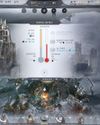Nvidia’s new RTX technology, explained

For as long as videogames have existed on a 3D plane, we’ve had those pesky CG movies and their superior visuals lording it over our real-time virtual worlds. The ray tracing rendering technique has played a defining role in that discrepancy—it’s one of the best methods of simulating light behavior around but, prior to Nvidia’s RTX graphics card reveal, it simply hasn’t been possible to achieve in real time.
Ray tracing’s been around for decades in movies, because movie CG takes its sweet time to render. At industry-leading effects houses such as Industrial Light & Magic, a 30-second scene might take three weeks to bake, while your poor old PC has to do everything—objects, surfaces, shadows, diffusion, reflections—before your monitor asks for the next frame. In the simplest terms possible, the more time afforded to a renderer, the more complex mathematics it can run to achieve a more realistic scene.
So when Nvidia announced that its new Turing GPUs were capable of running this impossible clusterfluff of arithmetic in real time, the graphics giant did so knowing it had just bridged the gap between prebaked CGI and gaming graphics. It used the term ‘Holy Grail’ a lot during the 20xx series card reveal, and you can understand why. Developers have been promising movie-level graphical fidelity in videogames for years now, most notably CD Projekt RED, whose magnum opus The Witcher 3… um, didn’t exactly fulfil that promise. You look wonderful, Geralt dear, but you’re not exactly making gamers rub their eyes in cartoon-like disbelief that what they’re seeing isn’t reality.
THE LIGHT FANTASTIC
Esta historia es de la edición Holiday 2018 de PC Gamer US Edition.
Comience su prueba gratuita de Magzter GOLD de 7 días para acceder a miles de historias premium seleccionadas y a más de 9,000 revistas y periódicos.
Ya eres suscriptor ? Conectar
Esta historia es de la edición Holiday 2018 de PC Gamer US Edition.
Comience su prueba gratuita de Magzter GOLD de 7 días para acceder a miles de historias premium seleccionadas y a más de 9,000 revistas y periódicos.
Ya eres suscriptor? Conectar

"The War Within itself has kept me coming back most evenings too"
WORLD OF WARCRAFT remains my jailer, and I couldn't be more pleased about it

OK BUILDER
SATISFACTORY is the new titan in building and crafting games

HELL YES
DIABLO IV: VESSEL OF HATRED is a transformative expansion

MOUSE: PI FOR HIRE
This mouse wants to be more than just a gimmick

WINDBLOWN
Dead Cells dev's new roguelike has me afraid for my free time

NO MORE ROOM IN HELL 2
As the zombie horde surrounded me just moments after taking down my two remaining teammates, the writing was really on the wall. Armed with just a chef's knife, it was clear I stood no chance, but I was going down swinging, hoping for a miracle... it didn't come.

OWNED BY STEAM
VALVE cordially reminds you that your games aren't yours

CURSE OF THE AZURE BONDS
These classic games haven't aged badly, but I sure have.

DEEP FREEZE
Endure a blizzard of tough choices and rough consequences in FROSTPUNK 2

NEW HORIZONS
Building up REMNANT 2 outside the live service game grinder